Initiative Afrique
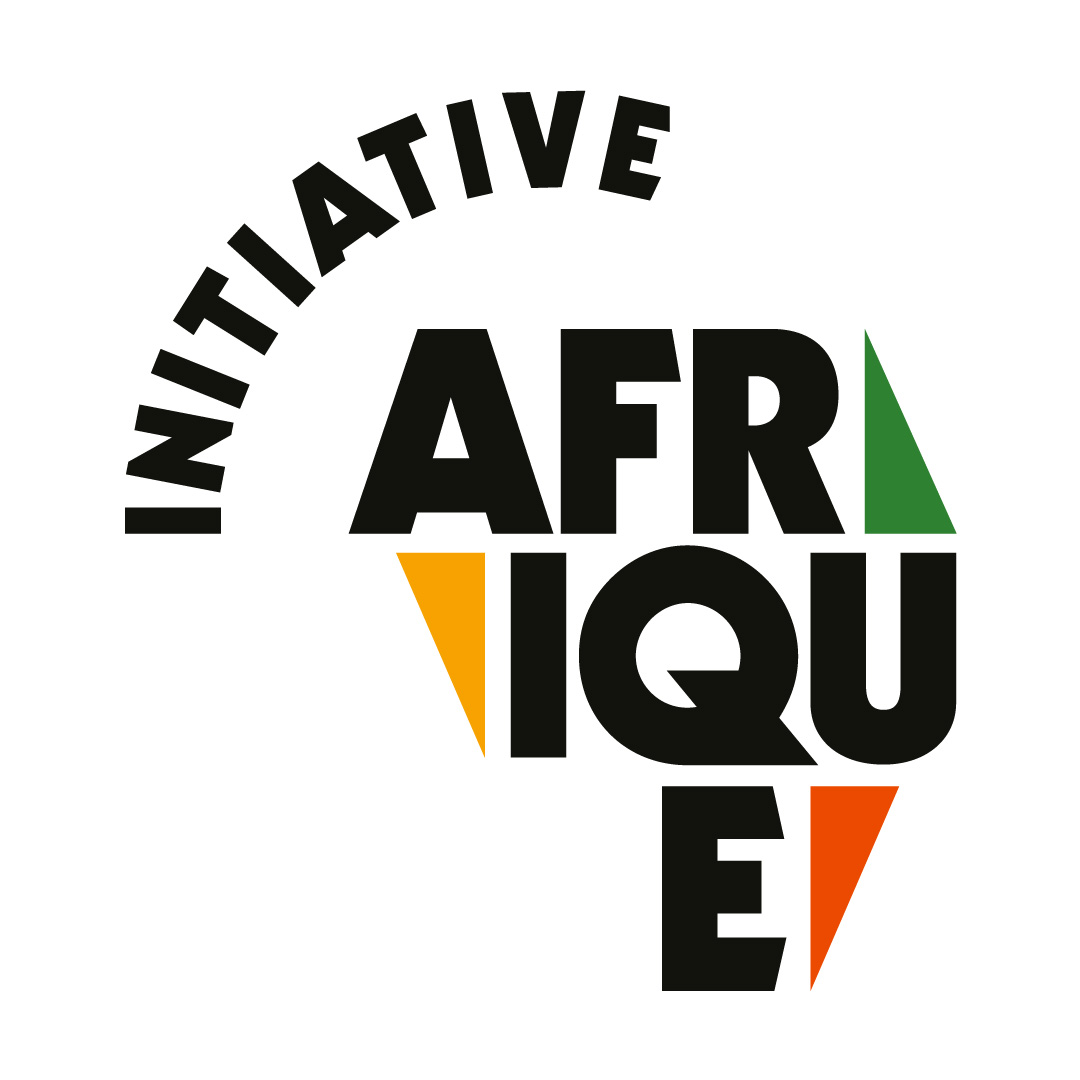
La page en français se trouve ici.
African universities are important partners for the University of Bern. With the Initiative Afrique, the UniBE is placing a new emphasis on its internationalisation strategy, which bundles expertise in Africa and promotes networking. On this website, you will find information on existing activities and resources.
For many years, the University of Bern has been strongly committed to promoting science and fostering global research networks, particularly with partners in Africa. "We firmly believe that tackling global problems requires global cooperation – a principle on which our internationalization strategy is based," says Hugues Abriel, Vice-Rector for Research and Innovation at the University of Bern.
The Initiative Afrique was created by the Vice-Rectorate Research and Innovation and the Vice-Rectorate International and Academic Careers. It serves as a platform for bundling all the research activities related to Africa and facilitating better networking within and outside the University of Bern. It is intended that other projects and synergies will be supported by the initiative.
Organisation of Initiative Afrique
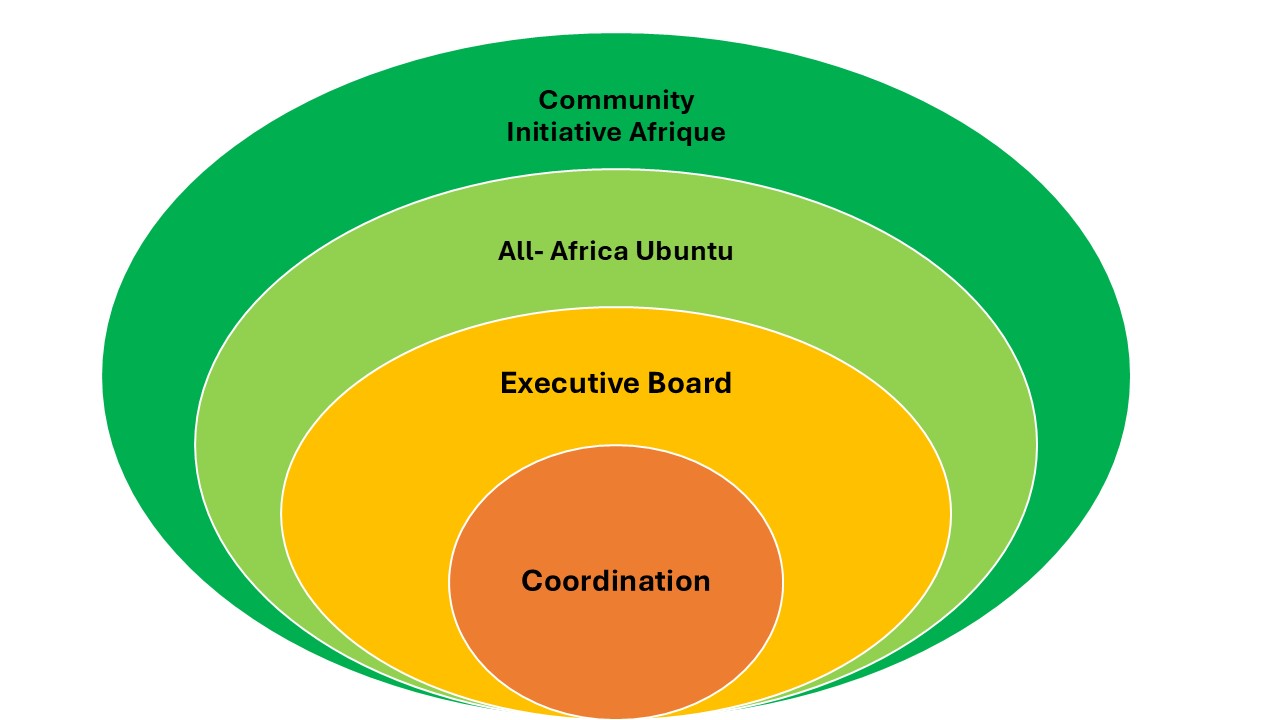

COMMUNITY
Podcast series
In these podcasts, members of the Community Initiative Afrique are interviewed. They talk about their origins, their academic careers and their experiences at the University of Bern. Follow our podcasts:
Margaret Owuor – Challenges for researchers
Podcast episode with Margaret Owuor
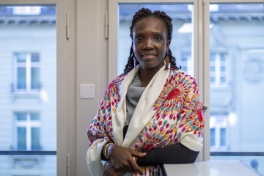
Margaret Owuor, Professor of Integrative Biodiversity Conservation Science at the Wyss Academy for Nature, shares in this episode of the Initiative Afrique podcast her insightful views on her role as an African scientist at the University of Bern and the challenges African researchers still face. She believes there is a need for inclusivity in the job opportunities and the grant processes. She feels that one of her roles as an African researcher is promoting meaningful, fair, and open collaboration. The biggest challenge for her is creating a “safe space” for interactions among African researchers at the University of Bern.
Moderator: Djouroukoro Diallo. Production: Patricia Teixidor
Music: Intro and outro: “Yadina” (xylophone duet). CD 1. MBUDI MBUDI NA MHANGA- NYMBO ZA WADODO. The Musical Universe of the Wagogo Children from Tanzania. ©PoloVallejo. Musical pauses: Ksu Leer Yi, “Youssoupha Sidibe”; LaFaena, “Primitive Ritual”; Maria de Barros, “Cabinda A Cunene”. Free Music Archive.
Nada El Makhzen – Challenges for students
Podcast episode with Nada El Makhzen
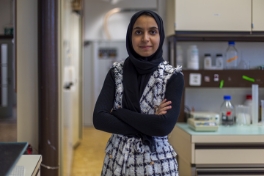
In 2022 Nada El Makhzen arrived in Bern (Switzerland) from Fez (Morrocco) to pursue a PhD at the Institute of Biochemistry and Molecular Medicine. In this episode of the Initiative Afrique Podcast, Nada shared with us the challenges she faced when applying to the University of Bern. Despite the paperwork, she has some encouraging words for any African student wanting to come to Europe: “Do not lose hope, keep up!”. She feels a big responsibility upon her shoulders for being an African scientist at the University of Bern because she “must show that Africans are here, can do a lot and have a scientific mindset”.
Moderator: Djouroukoro Diallo. Production: Patricia Teixidor
Music: Intro and outro: “Yadina” (xylophone duet). CD 1. MBUDI MBUDI NA MHANGA- NYMBO ZA WADODO. The Musical Universe of the Wagogo Children from Tanzania. ©PoloVallejo. “Ibn Al andalus”, by Fatimamhedden. Tribe of Noise PRO Bronze licence.
Jean Claude Makangara – Different cultures
Podcast episode with Jean Claude Makangara
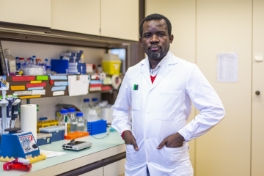
Jean Claude Makangara is a medical doctor and researcher from the Democratic Republic of Congo (Kinshasa) who is doing his PhD at the University of Bern in infectious diseases - virology and bioinformatics. In this episode he shares with us the multiple challenges he faced when arriving to Bern in 2023, such as the cultural clash that implies living “always close to your watch”! He thinks that studying at the University of Bern represents a huge opportunity for his career and feels as an ambassador of the Congo (the Institut National de Recherche Biomédicale, DRC). When he finishes his PhD, he plans to go back to his country and continue his work in Ebola and other infectious diseases.
Moderator: Djouroukoro Diallo. Production: Patricia Teixidor
Music: Intro and outro: “Yadina” (xylophone duet). CD 1. MBUDI MBUDI NA MHANGA- NYMBO ZA WADODO. The Musical Universe of the Wagogo Children from Tanzania. ©PoloVallejo. Musical pauses: John Bartmann, “Cuban Heat”; Ugo Mbaise, “Garri Gwu”, “Ofu Iko Mmanya”; Maria de Barros, “Cabinda A Cunene”. Free Music Archive.
Djouroukoro Diallo – Coordinator of Initiative Afrique
Podcast episode with Djouroukoro Diallo

Djouroukoro Diallo came to Bern in 2007 thanks to a Master's scholarship from the canton for outstanding international students from Mali. He now works as an Associate Researcher at the Centre for the Study of Language and Society (CSLS) and is the coordinator of the Initiative Afrique. A few critical issues came out in this interview. He wants to contribute to showing a better image of Africa and considers himself a "minister" of the African continent. He firmly believes that Initiative Afrique is a welcomed opportunity to better integrate all people of African origin into the University of Bern. He thinks we should focus on decolonization, expanding funding opportunities and establishing partnerships for the future.
Moderator: Hugues Abriel. Production: Patricia Teixidor
Music: Intro and outro: "Yadina" (xylophone duet). CD 1. MBUDI MBUDI NA MHANGA- NYMBO ZA WADODO. The Musical Universe of the Wagogo Children from Tanzania. ©PoloVallejo. Musical pauses: Studio Mali - Wake Up - "It's Africa Calling"; John Bartmann, "African Bliss"; Giacomo Forte, "Nairobi"; Serge Cuadrado, "Voronkov - Arabic Action". Free Music Archive.
Frank Mintah – Supporting students
Podcast episode with Frank Mintah

Frank Mintah is a PhD Researcher at the Institute of Geography, University of Bern. He holds a Master of Philosophy (MPhil) degree in Planning (Urban Planning and Land Governance) from the Kwame Nkrumah University of Science and Technology (KNUST) in Ghana. During this episode, he shared invaluable input about what activities Initiative Afrique could promote to offer extra value to African students. He mentioned career orientation programs, capacities, skills development tailored to the African landscape and transferable skills. The most critical point for him is how Initiative Afrique could support African researchers in moving beyond publishing a paper in a scientific journal. How can policies be impacted once they return to their countries of origin?
Moderator: Djouroukoro Diallo. Production: Patricia Teixidor
Music: Intro and outro: "Yadina" (xylophone duet). CD 1. MBUDI MBUDI NA MHANGA- NYMBO ZA WADODO. The Musical Universe of the Wagogo Children from Tanzania. ©PoloVallejo. Musical pauses: Habib Koite, "Barra"; Sere Quadrado, "Brazilian"; Ballaké Sissoko and Vincent Ségal, "Niadou". Free Music Archive.
Zerihun Tadele – Establishing a link between Africa and Europe
Podcast episode with Zerihun Tadele
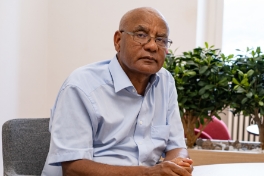
Prof. Zerihun Tadele is a group leader in Crop Breeding and Genomics at the Institute of Plant Sciences at the University of Bern. He has a long history as a scientist at UniBE, 21 years! He is currently working on a HORIZON project called “Booster” involving 12 countries —among which is his country of origin, Ethiopia. It aims to improve drought tolerance in both maize and teff, while simultaneously exploring the potential for transferring species-specific drought responsive features. With this project, they are connecting Africa and Europe. For him, Initiative Afrique brings assets not only to Africans but also to friends of Africa! His advice to new African students arriving in Bern is to adapt to the working conditions and be open to integrating oneself in a team.
Moderator: Hugues Abriel. Production: Patricia Teixidor
Music: Intro and outro: "Yadina" (xylophone duet). CD 1. MBUDI MBUDI NA MHANGA- NYMBO ZA WADODO. The Musical Universe of the Wagogo Children from Tanzania. ©PoloVallejo. Musical pauses: Tim Taj, "Desert Mysteries"; John Bovey, "Desert Days on Earth"; "Ethiopia". Free Music Archive.
Samuel Agyekum – “We should not be in a bubble.”
Podcast episode with Samuel Agyekum

Samuel Agyekum is a PhD student at the Institute of Geography, University of Bern. He holds an MSc in Urban Environmental Management (Land Use Planning) from the Wageningen University and Research (The Netherlands). He arrived in Bern one year and a half ago after pursuing his bachelor's at Copenhagen as an Erasmus student and an MSc in The Netherlands. He was born in Kumasi, one of the largest cities in Ghana, one of the few anglophone countries in the region. He feels that as an African scientist at the University of Bern, he has an epistemic responsibility to transmit true claims about his domain of research between Africa and Europe while at the same time, he has a social responsibility to align his research towards “desirable” ends and democratically held values. About promoting exchanges among UniBE and African institutions, he reminds us of a Ghanaian proverb: “The path paver is not always aware that his back is crooked”, so you often need people by your side or behind you to steer collaborative processes. Inviting scholars from Africa to share their knowledge about how things work in their countries is one of the steps to achieving this collaboration. He thinks that Initiative Afrique is a good starting point as a platform where African researchers can discuss about common issues, always keeping in mind that “we should not be in a bubble”.
Moderator: Djouroukoro Diallo. Production: Patricia Teixidor
Music: Intro and outro: "Yadina" (xylophone duet). CD 1. MBUDI MBUDI NA MHANGA- NYMBO ZA WADODO. The Musical Universe of the Wagogo Children from Tanzania. ©PoloVallejo. Musical pauses: Habib Koite, "Barra"; Sere Quadrado, "Brazilian"; Ballaké Sissoko and Vincent Ségal, "Niadou". Free Music Archive.
Philipa Birago Akuoko – Gender studies and women’s welfare in global south cities
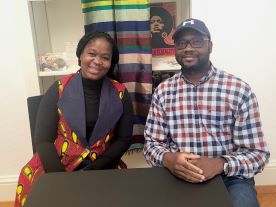
Podcast episode with Philipa Birago Akuoko
Philipa Birago Akuoko arrived in Bern to pursue a PhD at the Institute of Geography two years ago from Kumasi, Ghana. She is an urban development researcher focusing on spatial planning and informal economy through predominantly qualitative case studies and mixed-method approaches. Her interest also covers gender studies and women’s welfare in global south cities. Her biggest challenge at the University of Bern has been living alone without her infants and family, “fighting loneliness” every day. On the positive side, what she values most is the swiss canton’s uniqueness, the fact that each one has its identity and iconic image. She feels that one of her roles as an African researcher is to show other people what an African is; as an African woman, her role is to highlight misconceptions. She explained to us how important community building is for Africans and how much Africans love the idea of identifying with others. She suggested that Initiative Afrique could promote more social activities, such as a monthly lunch to share different cultures in a more informal environment. When asked about how to improve research collaborations south-north Philipa mentioned that Swiss researchers could benefit from the local environment, by getting in contact with researchers in Ghana through research stays.
Podcast episode with Philipa Birago Akuoko (MP3, 11.4 MB)Cecilia Olima – One can still achieve his dreams, even if you decide to have a family
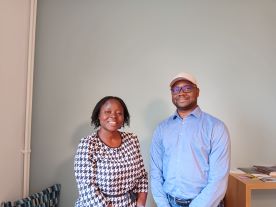
Podcastfolge mit Cecilia Olima – One can still achieve his dreams, even if you decide to have a family
Cecilia Olima arrived in Bern 3 years ago to pursue a PhD in the Integrative Biodiversity and Conservation Science research team at The Wyss Academy for Nature at the University of Bern. She holds a master's degree in Plant Ecology from Kenyatta University. Her master's project focused on assessing coastal protection and harvested goods provided by the mangrove forest in Mida creek, Kenya. She is passionate about the sustainable use of ecosystems and raising awareness among different stakeholder groups regarding environmental issues and possible ways to solve them. She would like to be a role model to African girls and women, giving them an example of the fact that one can still achieve their dream, even if you decide to have a family. It is never too late to go to school.
Podcast with Cecilia Olima – One can still achieve his dreams, even if you decide to have a family (MP3, 9.7 MB)Association All-Africa Ubuntu
Association All-Africa Ubuntu
The All-Africa Ubuntu Association is an official organisation of students and employees of the University of Bern who come from Africa or have African roots. The organisation is committed to improving the representation and integration of this community at the University of Bern. All-Africa Ubuntu is based at the University of Bern. It is politically and denominationally independent. The association also aims to strengthen bilateral relations between the University of Bern and partner institutions on the African continent.
African menus in the UniBE canteens
As part of the FOKUS "Africa" theme (August to October 2024), an African dish will be served on four Thursdays between 26 September and 17 October – in collaboration with the ZVF – at each of the following canteens: Gesellschaftsstrasse, vonRoll, UniS and Unitobler as well as Café Max, Bistro Mitte and Bistro Sport. The menus were selected by African researchers from the University of Bern. African snacks and drinks will also be available throughout the event.
Menu selection
Thursday, 26 September 2024
"Pilau" – a rice dish from Kenya with beef and vegetables
Prof. Dr. Margaret Owuor from the Wyss Academy for Nature suggested the dish.
Thursday, 3 October 2024
Vegetable tagine with couscous — a Moroccan stew
PhD candidate Nada El Makhzen from the Institute of Biochemistry and Molecular Medicine suggested the dish.
Thursday, 10 October 2024
"Jollof" – a tomato rice dish with chicken and vegetables from Ghana
PhD candidate Frank Mintah from the Geographical Institute suggested the dish. Find out here why Frank Mintah chose this dish
Thursday, 17 October 2024
"Mafé" – a vegetarian peanut stew from Mali
Dr. Djouroukoro Diallo from the Center for the Study of Language and Society and Coordinator of the Afrique Initiative suggested the dish. Find out here why Djouroukoro Diallo chose this dish.
Snacks
The following snacks will be offered in addition to the menus:
– "Gatsby sandwich" with pulled plantain, peppers, iceberg lettuce and peri-peri mayo
– Vegetarian tabbouleh salad with couscous, Marrakech-style vegetables and mint yogurt
Drinks
"Tangawizi lemonade" made from ginger, honey, mint, lemon juice and water
The Guild and ARUA
The University of Bern has recognized expertise in research on Africa and many years' experience of working with African partners. Joining The Guild of European Research-Intensive Universities (The Guild) was an opportunity to further strengthen this commitment, as this network works closely with the African Research Universities Alliance (ARUA).
As experts in international research collaboration, ARUA and The Guild launched the Cluster of Research Excellence (CoRE) initiative. The aim of this initiative is to create, through clusters, a new model of collaborative research that emphasizes equal opportunities as a prerequisite for effective research excellence. At the same time, clusters should make central contributions to global science in the key areas (public health, green transition, innovation and technology, capacities for science) of the African Union (AU)-European Union (EU) Innovation Agenda. In 2023, ARUA and The Guild launched 20 Africa-Europe CoRE.
The Africa-Europe CoREs are jointly coordinated by a member of The Guild and a member of ARUA and are characterized by a long-term vision. In addition to joint research projects, the focus is on promoting young researchers, for example by establishing a joint doctoral program.
Two of these Africa-Europe CoREs are led by strategic centers of the University of Bern together with African partners. The Multidisciplinary Center for Infectious Diseases (MCID) leads a CoRE with a focus on medical genomics, and the Centre for Development and Environment (CDE) leads a CoRE on sustainable water and land management.
Research & Innovation Briefing 2025
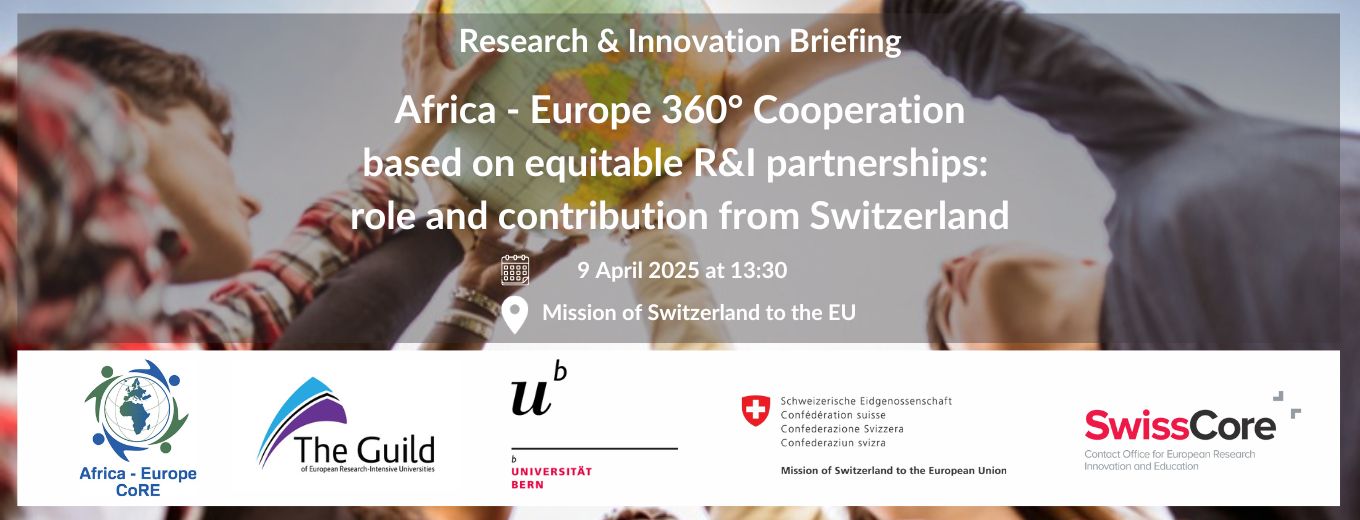
Africa – Europe 360° cooperation based on equitable R&I partnerships: role and contribution from Switzerland
The African Union (AU) and the European Union (EU) adopted in July 2023 the joint AU-EU Innovation Agenda to enhance cooperation in science, technology and innovation. At the same time, universities have been engaged and contributing to the priority areas of the AU-EU Innovation Agenda. Research, innovation, education and universities as networked actors can be a key part of a competitive, 360-degree approach for Europe’s international partnerships with colleagues in Africa and across the wider global stage. One of them is the Africa-Europe Clusters of Research Excellence (CoRE) launched by the African Research Universities Alliance (ARUA) and The Guild of European Research-Intensive Universities. Twenty-one CoREs have been established and they are demonstrating a new form of widespread collaboration, with the best researchers from both continents involved. This collaboration is enabled by resources committed by universities, the private sector and civil society. They have ambitious long-term plans at the cutting edge of excellent science and socio-economic challenges to produce outcomes of mutual, strategic benefit for Africa and Europe. CoREs offer an opportunity for sound investment to enhance cooperation between the continents by scaling up, consolidating existing efforts and building an ecosystem between different actors on both continents. In this R&I Briefing, hosted by the Swiss Mission to the EU and co-organised by the University of Bern, The Guild and SwissCore, we invite representatives from several CoREs to present their initiatives, achievements and challenges faced while engaging in international cooperation. Thus, we will gain insights into topics such as Genomics for Health, or Sustainable Water and Land Resource Management for Human Well-Being.
Background on research collaborations
The EU declared ties with the AU a new priority for 2019. The Guild then recognized that, in this context, an ambitious new initiative for African-European academic cooperation was also needed. To this end, it entered into a partnership with ARUA. The two networks subsequently published a position paper and a concept paper containing proposals for scientific collaboration. In these documents, ARUA and The Guild criticized the lack of coordination between research policy and development policy and pointed out that insufficient emphasis was placed on strengthening the research capacity of African universities. Instead of promoting individual projects, long-term alliances should be supported to encourage scientific capacity building. The Guild and ARUA have therefore proposed the creation of "clusters of research excellence" to meet the common challenges of Africa and Europe and thus make a sustainable investment in Africa's knowledge community.
The two documents met with a great response, both from the European Commission and from European and African academic circles. For example, more than 200 researchers from all over the world, particularly from Africa, published a declaration supporting the positions defended by The Guild and ARUA. The importance of academic cooperation in EU-AU relations was also demonstrated at the sixth European Union-African Union summit in February 2022, where a new joint innovation agenda was adopted. All the central requests and proposals made by The Guild and ARUA were included, such as the establishment of clusters of excellence - a great success for both networks.
African Research Universities Alliance (ARUA)
ARUA was inaugurated in Dakar in March 2015 and brings together sixteen of Africa's leading universities.
ARUA aims to become a pan-African network that, by developing strong research universities, will advance academic excellence across the continent to find solutions to Africa's development challenges.
The Guild
The Guild was founded in 2016 and counts among its members 21 of Europe's top research-intensive universities from 16 countries. It is committed to strengthening the voice of academic institutions, research teams and the student body. The Guild is committed to the pursuit of excellence, the recognition of truth and the establishment of trust as the basis of public life. The Guild is also committed to creating new knowledge that will benefit society, culture, and economic growth. The University of Bern has been a member of The Guild since 2017.
Cross-border research partnerships
The Commission for Research Partnerships with Developing Countries (KFPE) of the Swiss Academy of Sciences (SCNAT) has developed guidelines for cross-border research partnerships.
Equitable partnerships
The Guild and ARUA have collected extensive resources for establishing equitable partnerships and made them available on their website (e.g. codes of practice, guidelines, case studies, reports).

